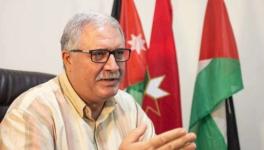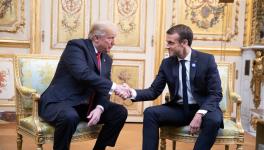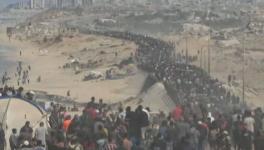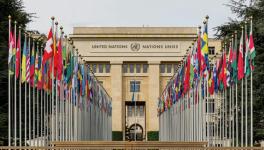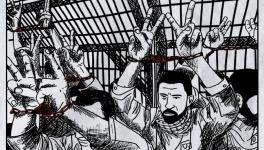In Memory of Walid Daqqah
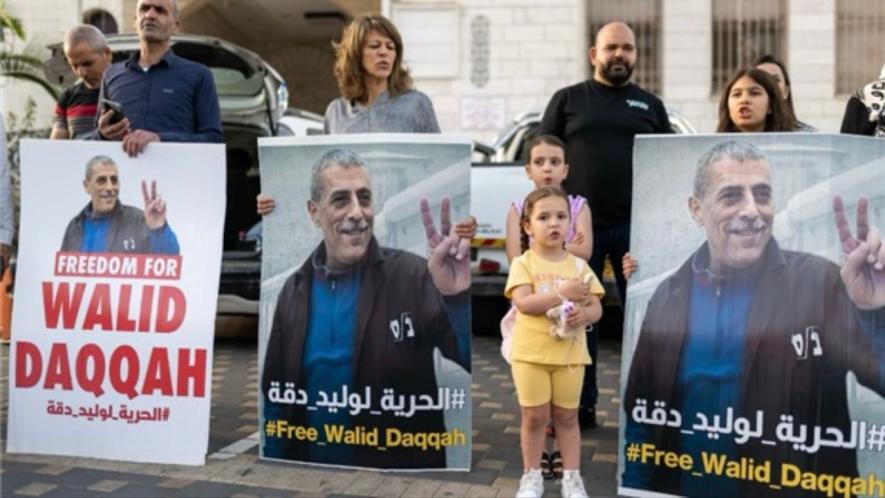
Milad Daqqa (center) at a demonstration demanding her father’s release from prison. Photo via Jadaliyya
On 26 March 2011, the first day of his twenty-sixth year in captivity, Walid Daqqah penned a letter that was smuggled from his prison. “I write to a child, yet unborn” was for Milad, his (then) unborn child. He tells the child of his dreams, and he describes the reality of imprisonment. “Today, I finish my twenty-fifth year in prison: 9131 days. This is a number that does not end. This is my prison age that has not stopped. I have turned fifty years old, and my life has been equally divided between prison and life outside prison.” In the letter, Daqqah asserts that the Israeli security establishment has already created a “security file” for his unborn/dream child. “What is madness: a nuclear state fighting an unborn child and already considering him/her a security threat, or is it to dream of having a child? What is madness: to write a letter to a dream, or that the dream becomes a file to be dealt with by the intelligence agencies?” He continues:
I write to a child, yet unborn …
I write to an idea or a dream that intentionally or unintentionally frightens the jailer; even before becoming a reality,
I write to any child,
I write to my child that has not been born yet,
I write to the birth (Milad) of the future.
This is how we want to name our child,
and this is exactly how I would like for the future to recognize us […]
Will I stop dreaming?
I’ll continue to dream despite this cruel reality,
I’ll search for a meaning for life despite what I have already lost.
They dig ancestors’ cemeteries searching for a delusional authenticity,
while we search for a better future for our grandchildren; one certain to come.
Salaam Milad, salaam my dear.
Walid Daqqah is one of dozens of Palestinians to die inside Israeli prisons and detention centers since Israel’s ongoing genocidal war began on October 7, 2023. Indeed, since the beginning of the war, the Israeli authorities intensified their carceral violence and withdrew the meager rights Palestinian prisoners had earned by decades of struggle. These include banning all forms of communication between prisoners and their families, refusing to provide sufficient quantities of food, intensified torture, systematically denying medical care, and withholding medicines. The Israeli authorities denied Walid Daqqah medical treatment for his bone marrow cancer, which was diagnosed in 2022, and adequate food even when he was held in an Israeli “hospital.”
Daqqah’s prison age, a description emerging from the metaphor of “parallel time” that he had long written about, only stopped after 13,893 days in captivity. He died surrounded by brutal Israeli prison service guards and unable to see his wife, Sanaa, and his four-year-old daughter, Milad. His revolutionary age, however, is eternal. Throughout his thirty-eight years of imprisonment, Walid Daqqah never stopped dreaming, working for, and writing about freedom.
Walid Daqqah was born on 18 July 1961 in Baqqa al-Gharbiya, a Palestinian town in the areas conquered by the Israeli regime in 1948. At the age of twenty-four, he was arrested and accused of participating in the kidnapping of an Israeli soldier for the purpose of exchanging him for Palestinian prisoners. Daqqah continuously rejected the accusations, but that never mattered. He was convicted and sentenced to life by the military court in al-Lydd. The sentence was later reduced to 37 years, and he was supposed to be released on 24 March 2023. In 2018, however, an Israeli court added two years to Daqqah’s sentence after accusing him of participating in the smuggling of cellphones to Palestinian prisoners. His new release date was supposed to be 24 March 2025. The Israeli authorities have decreed that they will keep his body in custody until his sentence is up, a long-practiced policy of holding captive the dead bodies of Palestinian martyrs.
Despite Daqqah’s critical health condition, the Israeli regime refused his family’s requests for early release. In June 2023, the government rejected an appeal for his early release, claiming that his condition was “not serious enough” and that he does not qualify for early release because he was convicted of “an act of terrorism.”
Walid Daqqah’s Freedom(s)
Freedom is a state of being that Daqqah embodied and radiated, despite the settler-colonial regime’s violence and its continuous attempts to break his spirit and prevent his dreams from materializing. During his thirty-eight years of imprisonment, Daqqah was continuously smuggling freedom from, and within, his prison cell. He continues to do so.
Freedom is a state of being that Daqqah embodied and radiated, despite the settler-colonial regime’s violence and its continuous attempts to break his spirit and prevent his dreams from materializing.
In 1996, he fell in love with Sanaa Salameh, a journalist he met in a prison visitation room. In 1999, he forced the Israeli authorities to allow him to get married inside Asqalan prison, with the presence of his comrades, members of his family, and Sanaa’s family. He even dictated the terms and arrangements of the wedding ceremony. Their wedding was the only day that Sanaa and Walid managed to take family photos.
The Israeli authorities continuously denied Walid the right to conjugal visits with Sanaa, a right that is granted to Jewish prisoners but categorically denied to Palestinians labeled as “security prisoners.” In its response to one of the petitions submitted by Adalah: The Legal Center for Arab Minority, the Nazareth District Court refused Daqqah’s petition for conjugal visit, arguing that secret evidence shows that Walid “has connections to anti-Israel organizations, and that he could use intimate meetings with his wife to exchange information harmful to the state’s security.” This response, of course, forms part of the logic through which the Israeli carceral regime has always functioned vis-à-vis Palestinian prisoners.
Walid and Sanaa, however, did not give up. Their “dream of freedom” arrived with the birth of Milad in February 2020; she was conceived through smuggled sperm. This was a unique triumph because the dream Walid wrote about in the letter commemorating his twenty-fifth year in prison became a reality. In the same letter, he writes, “from all that I have smuggled out from my memory, you are the most beautiful: you are message to the future.” Milad recently celebrated her fourth birthday. She kept the decorations in the hope that her father would be released soon and would be able to see them for himself.
Daqqah was a prolific writer and intellectual. He wrote the most poignant and incisive analyses of Israel’s carceral regime, torture, and the Palestinian struggle for liberation. He anticipated the future, warned of repeating the past, and continuously sought freedom. In Control Through Time, smuggled from prison in 2021, Daqqah discusses the control of prisoners’ time as a core tactic through which the prison authorities work to “confiscate the subject as a political agent until reaching its politicide.” In the text, Daqqah scrutinizes the modern prison and its associated modes of control and suggests that the Palestinian political establishment has not only lost “its ploy and will, but its potential for imagination.” This text, much like his Consciousness Molded or the Re-identification of Torture, touches on Palestinian reality both as it relates to the experience of imprisonment, and to ways in which Israeli prisons have come to represent the broader geographic and political context. Warning of what might be coming, he asks Palestinians to tightly hold onto hope and freedom.
One of his children’s literature books titled Hikayat Sir al-Zeit (The Oil’s Secret Tale) was published in 2018, predating the birth of his child. Reading it, one is left to imagine the violence endured by Palestinian prisoners and their families, the pain and joy Daqqah was feeling with the birth of his daughter, and the “better future for our grandchildren” that he wrote and dreamed about. This story narrates a Palestinian child’s search for a way to visit his father in prison despite a security ban imposed on him and his entire family. Joud, the story’s main character, is a Palestinian boy who was conceived through smuggled sperm and who had never been able to visit his father. With the help of his animal friends and an old and wise olive tree (which gets uprooted later in the tale), Joud uses what Walid refers to as the ‘oil’s secret’ to disguise and smuggle himself and his friends to his father’s prison cell. Joud gets to meet his father for the first time, and the story ends with a scene in which numerous Palestinian children are swimming in the sea for the first time.
In an audio recording that circulated following the publication of this story, Daqqah says,
Prison is not the only thing that holds us captive with its walls and barbed wire. If you ask me the most important conclusion I’ve arrived at throughout the three decades and half I spent in captivity, I would say that we lost Palestine not because we are weak, but because we are weak and divided due to ignorance. Ignorance is our most furious enemy, it’s more dangerous than prisons, as it transforms your mind into a prison-cell in which your future and the future of generations to come are held captive. My motive in writing The Oil’s Secret Tale was not creative writing but rather sumud (steadfastness) in captivity, for sumud was not possible throughout these long years without liberating my mind from its prison cell, little by little. As much as I yearn for liberation from prison, I yearn for liberating prison from myself. What caused me the most pain is that through my captivity I “lived” with the grandfather, the father, and the son, and I recognized a scenario that keeps repeating itself, as if captivity is inherited. Therefore, I wanted Joud to emerge from The Oil’s Secret Tale against all odds, and to forge a path that does not lead to prison. I wanted him to think of a future that is different from ours. I wanted to release the imagination for these generations in order to be released from the scenarios that have been scripted for us and that we have scripted for the next generations, and a whole nation that entered captivity. I write to release myself from prison, with a hope to release it from myself.
Walid Daqqah strived to release our collective imagination and he dreamed of a reality in which the scenario of inheritance where captivity is a destiny bestowed upon Palestinians for generations to come can finally be broken. Reading his words, one can understand why the Israeli regime has continuously punished Daqqa every time he managed to liberate his words and smuggle them outside the confines of his prison cell. These include banning the publication of The Oil’s Secret Tale, and removing from the list of approved cultural performances for students a play inspired by his writings, “A Parallel Time.”
Daqqah’s life and revolution, his multitude of writings and drawings, and the impact he left on those who have met him either personally or through his writings, are legend. They explain the collective sadness, and the protests that spontaneously began following the news of his martyrdom.
“The molding of consciousness is only for slaves,” one of the protestors loudly chanted as a protest march was wending through the streets of Ramallah. The protestor was referring to one of Daqqa’s most renowned texts, Consciousness Molded or the Re-identification of Torture, in which he warns against Israeli attemtpts—inside and outside Israeli prisons—to remold Palestinians accorindg to Israeli visions and wishes, and to steer them away from engaging in resistance practices.
Indeed, Walid Daqqah continues to loudly tell us: we can only survive if we keep our compass and consciousness alive.
“Love is my modest and only victory against my jailer”
In a letter written on the anniversary of his twentieth year in prison, Daqqah writes, “I write to you from the parallel time. Here, in this parallel time where place is still, we only use your normal time measurement units (like minutes and hours) when our temporal lines meet in the prison visitation room. These time measurement units are the only thing that did not change in your time, and we still remember how to use them.” He ends the letter by noting that love is his modest and only victory against his jailer.
How did Daqqah survive thirty-eight years in captivity, counting every second, minute, hour, and day he spent held by a fascist and violent settler regime intent on his—and the Palestinian people’s—elimination? How close did he, and the other Palestinians killed inside Israeli prisons during the past six months, feel their freedom? How beautiful would his hug to Milad have been once they finally reunite, and when she gets to show him her room, her decorations, and introduce him to her friends?
“You are my message to the future,” he told Milad years before her birth.
These questions are difficult and haunting, particularly as we continue to witness the infliction of genocidal violence inside and outside Israel’s multiple prisons—both literal and metaphorical, as Daqqah has always taught us.
One thing is certain, however. Walid Daqqah’s victory over his jailer extends beyond the love he received and the love he felt for his family, people, and cause. Every moment of his thirty-eight years of imprisonment, and those before, were defined by victory over his jailers and the violent regime they represent.
It is up to us to be victorious, now. Rest in power, Abu Milad.
Basil Farraj is an Assistant Professor at the Department of Philosophy and Cultural Studies at Birzeit University, Palestine. His work centers around torture, violence, and prisons.
This piece was first published at Jadaliyya
Get the latest reports & analysis with people's perspective on Protests, movements & deep analytical videos, discussions of the current affairs in your Telegram app. Subscribe to NewsClick's Telegram channel & get Real-Time updates on stories, as they get published on our website.










